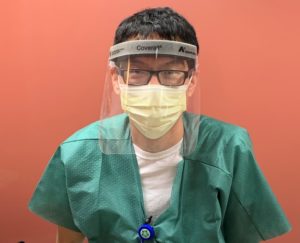Health care hero: Hospitalist David Chen
Doctor draws inspiration from experience as a patient
We are shining a light on our #healthcareheroes. Meet hospitalist David Chen, M.D., MPH.

What inspires you to be a caregiver?
I have been a patient with a collapsed lung, lying scared and alone and short of breath in a hospital bed. Clinicians who knew how to treat both the condition and the fear behind my breathlessness helped me feel hopeful. I want to offer that same kind of care. My favorite description of medicine is that it is “the most human of sciences, the most scientific of the humanities.”
How has your typical workday changed? What work are you doing or doing differently because of COVID-19?
Hospitalists’ knowledge of how systems influence care is as essential as that of any medicine. In a typical day, a clinician makes hundreds of decisions that direct care. Though these vary in complexity, each includes a set of estimations that fundamentally ask, “What is the risk and what is the benefit to this patient?”
COVID-19 now requires that we consider a whole new layer of uncertainty and apply a new set of estimations to each of those decisions. In addition to thinking through the complex and often unknown interactions between an individual’s medical history with COVID-19 itself, we must factor in its impact on our colleagues and rework many aspects to care we had previously taken for granted.
How can we safely cluster administration of medications to minimize exposure frequency and usage of personal protective equipment (PPE)? Which tests and interventions can be safely re-timed? Do patients have the resources to isolate or quarantine safely at home and still get the care they need? How do we talk about fear, uncertainty and other hard things to patients and caregivers through a mask and a phone?
What is keeping you motivated during these uncertain times?
One of the simplest and most powerful points of my faith is to be a good neighbor. When uncertain of how to move forward in a hard situation, I’m reminded of Martin Luther King Jr.’s sermon about three people who encountered a wounded man lying on the road: ”I can imagine that the first question which [was] asked was: “If I stop to help this man, what will happen to me?” Then the good Samaritan came by, and by the very nature of his concern reversed the question: “If I do not stop to help this man, what will happen to him?” Asking this question makes the path forward clearer even if it is more challenging.
What advice do you have for your fellow caregivers?
It’s okay to laugh. It’s okay to feel scared. Even while six feet apart, the moments of human connection we can share together in person at work, whether its laughing together or talking about the strangeness of life, are privileges we enjoy while serving our community. They remind us of what we’re working so hard to preserve and protect, and the way we reclaim those moments for the future is by taking care of each other now.
What advice do you have for our community?
In some cases, speed is essential. In others, the best thing is a critical pause to say: “Don’t just do something, stand there!” Thank you for taking that critical pause. As we all think through next steps moving forward, consider how you can take those pauses to check that what you’re doing is simple, safe, and sustainable. The age-old saying remains true: “An ounce of prevention is worth a pound of cure.”